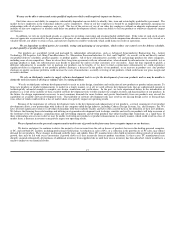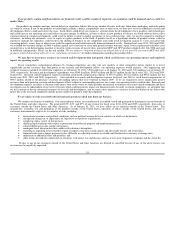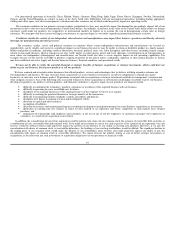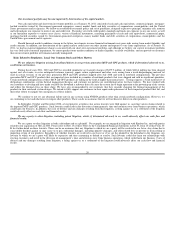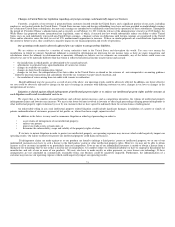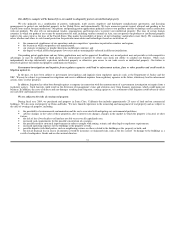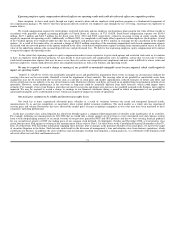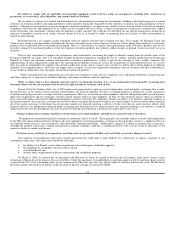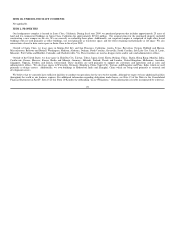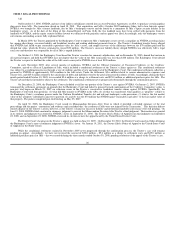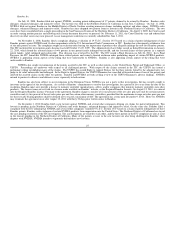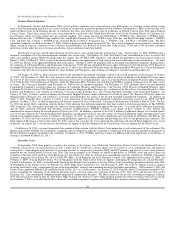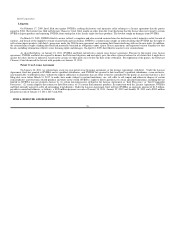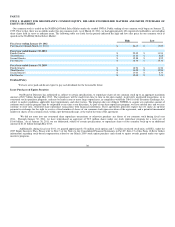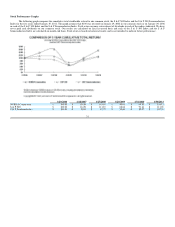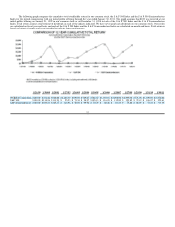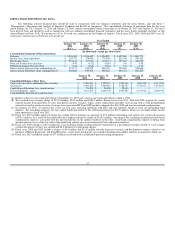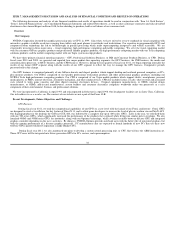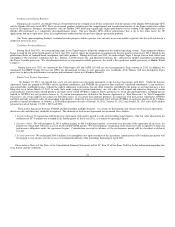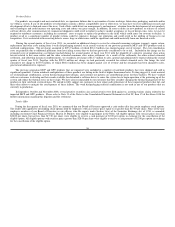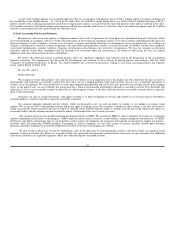NVIDIA 2011 Annual Report Download - page 29
Download and view the complete annual report
Please find page 29 of the 2011 NVIDIA annual report below. You can navigate through the pages in the report by either clicking on the pages listed below, or by using the keyword search tool below to find specific information within the annual report.
Rambus Inc.
On July 10, 2008, Rambus filed suit against NVIDIA, asserting patent infringement of 17 patents claimed to be owned by Rambus. Rambus seeks
damages, enhanced damages and injunctive relief. The lawsuit was filed in the Northern District of California in San Jose, California. On July 11, 2008,
NVIDIA filed suit against Rambus in the Middle District of North Carolina asserting numerous claims, including antitrust and other claims. NVIDIA seeks
damages, enhanced damages and injunctive relief. Rambus has since dropped two patents from its lawsuit in the Northern District of California. The two
cases have been consolidated into a single proceeding in the San Francisco division of the Northern District of California. On April 13, 2009, the Court issued
an order staying motion practice and allowing only certain document discovery to proceed. On February 11, 2011, the Court lifted the stay and ordered that
discovery on other issues may now proceed. A case management conference is currently scheduled for June 3, 2011.
On November 6, 2008, Rambus filed a complaint alleging a violation of 19 U.S.C. Section 1337 based on a claim of patent infringement of nine
Rambus patents against NVIDIA and 14 other respondents with the U.S. International Trade Commission, or ITC. Rambus has subsequently withdrawn four
of the nine patents at issue. The complaint sought an exclusion order barring the importation of products that allegedly infringe the now five Rambus patents.
The ITC instituted the investigation and a hearing was held October 13-20, 2009. The Administrative Law Judge issued an Initial Determination on January
22, 2010, which found the asserted claims of two patents in one patent family infringed but invalid, and the asserted claims of three patents in a separate
patent family, valid, infringed and enforceable. This decision was reviewed by the ITC. The ITC issued a Final Decision on July 26, 2010. In its Final
Decision, the ITC found that NVIDIA infringed three related patents and issued a limited exclusion order prohibiting import of certain NVIDIA products.
NVIDIA is appealing certain aspects of the ruling that were unfavorable to NVIDIA. Rambus is also appealing certain aspects of the ruling that were
unfavorable to Rambus.
NVIDIA also sought reexamination of the patents asserted in the ITC, as well as other patents, in the United States Patent and Trademark Office, or
USPTO. Proceedings are underway with respect to all challenged patents. With respect to the claims asserted in the ITC, the USPTO has issued a
preliminary ruling invalidating many of the claims. The USPTO has issued Right to Appeal Notices for the three patents found by the administrative law
judge to be valid, enforceable and infringed. In the Right to Appeal Notices, the USPTO Examiner has cancelled all asserted claims of one of the patents and
allowed the asserted claims on the other two patents. Rambus and NVIDIA are both seeking review of the USPTO Examiner's adverse findings. NVIDIA
intends to pursue its offensive and defensive cases vigorously in both actions.
Rambus has also been subject to an investigation in the European Union. NVIDIA was not a party to that investigation, but has recently sought to
intervene in the appeal of the investigation. As a result of Rambus’ commitments to resolve that investigation, for a period of five years from the date of the
resolution, Rambus must now provide a license to memory controller manufacturers, sellers, and/or companies that integrate memory controllers into other
products. The license terms are set forth in a license made available on Rambus’ website, or the Required Rambus License. On August 12, 2010, we entered
into the Required Rambus License. Pursuant to the agreement, Rambus charges a royalty of (i) one percent of the net sales price per unit for certain memory
controllers and (ii) two percent of the net sales price per unit for certain other memory controllers, provided that the maximum average net sales price per unit
for these royalty bearing products shall be deemed not to exceed a maximum of $20. The agreement has a term until December 9, 2014. However, NVIDIA
may terminate the agreement on or after August 12, 2011 with thirty 30 days prior written notice to Rambus.
On December 1, 2010, Rambus filed a new lawsuit against NVIDIA and several other companies alleging six claims for patent infringement. This
lawsuit is pending in the Northern District of California and seeks damages, enhanced damages and injunctive relief. On the same day, Rambus filed a
complaint with the ITC alleging that NVIDIA and several other companies violated 19 U.S.C. Section 1337 based on a claim of patent infringement of three
Rambus patents. Rambus seeks exclusion of certain NVIDIA products from importation into the United States. The Northern District of California has stayed
the case pending resolution of the ITC investigation. The asserted patents are related to each other, and the three patents in the ITC complaint are also at issue
in the lawsuit pending in the Northern District of California. Many of the patents at issue in the new lawsuits are also being challenged in Rambus’ other
disputes with NVIDIA. NVIDIA intends to vigorously defend these new lawsuits.
27


